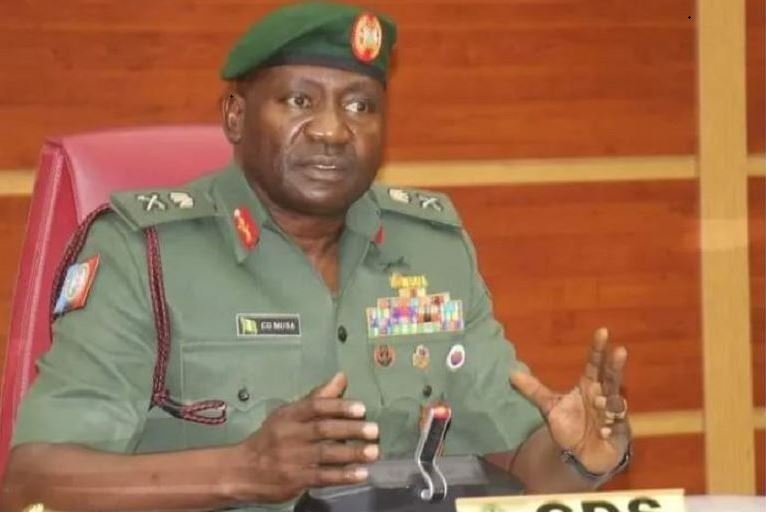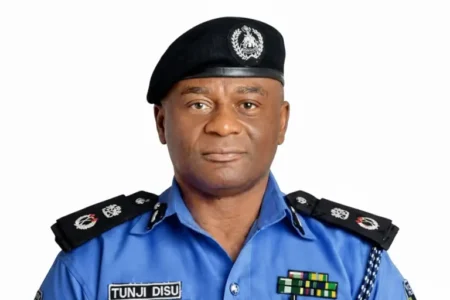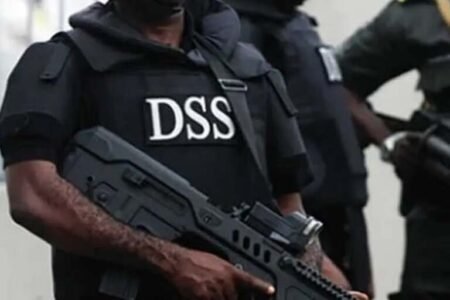As killings escalate across Nigeria, the Chief of Defence Staff, Gen. Christopher Musa, has warned that politics and foreign cash are at the heart of the bloodshed.
From mass murders in Katsina to recurring clashes in Plateau and Benue, Nigerians are once again facing the trauma of insecurity. Only days ago, 34 worshippers were slaughtered inside a mosque in Unguwar Mantau, Malumfashi Local Government Area of Katsina State.
For Musa, the pattern is no coincidence. Appearing on Channels Television’s Politics Today on Thursday, the Defence Chief pointed fingers at desperate politicians fueling chaos as the 2027 elections approach.
“Criminals, both bandits and terrorists, work together. They have a common goal to make money and destabilise communities. But there is also a political angle. Some individuals don’t want peace because when there is peace, the government is seen to be doing well. When there is no peace, the government is seen to be failing.
“Last year, we recorded the lowest number of deaths. How come this year, suddenly, everything has spiked? Politics is coming, the election is coming. You cannot rule out the fact that some people are controlling these criminals to ensure there is no peace, and governance is discredited. But the funny thing is, how do you kill the people you want to govern? What do you gain from it?” he asked.
But politics, Musa insists, is only one layer of the problem. Terror groups, he explained, are thriving on a steady flow of illicit funding both within and outside Nigeria.
“The process of naming terrorism financiers is on. Just last week, the AGF and others went to check. It has to do with legal issues and international connections. Some of them get funds from outside. The NFIU has been doing so much; arrests have been made, and prosecutions have started. Those behind the Owo bombing are already facing trial,” Musa disclosed.
Still, weak institutions remain a stumbling block. Musa did not hold back in blaming Nigeria’s slow legal process for enabling terrorists and their financiers.
“Also, it has to do with the legal system. Sometimes, legal intercepts, you take it to court, and it is knocked out for one reason or another. Again, we have to review our legal system because some of the punishments and prosecutions are slow and inadequate.
“If we have special courts, we will treat cases as quickly as they should. We also need to review the punishment for offences. But our laws need to be stringent, even for terrorism. Our legal system is frustrating. We need to unbundle it, make it faster and more stringent. Once people know they can get away with anything, impunity sets in, and we cannot prosecute.
“Sometimes you take evidence to court, and it is knocked out for one reason or another. Punishments are slow and inadequate. We need to unbundle our legal system, make it faster and more stringent. Once people know they can get away with anything, impunity sets in. For example, in the South-South, we arrest vessels, they pay peanuts, and the vessels return. That’s why we resorted to bombing them, though environmental concerns arose. But that has brought more peace than allowing the legal bottlenecks to continue,” Musa said.
Beyond Nigeria’s internal politics and weak laws, Musa drew attention to dangers spilling over from the Sahel. With porous borders and thriving arms markets in Libya, Niger, Mali and Burkina Faso, the Defence Chief said Nigeria is being targeted as the region’s biggest prize.
“Since Libya fell, the Sahel has been open. You can buy any weapon in those markets. Niger, Mali and Burkina Faso are also unstable. Everybody is interested in Nigeria because it is rich and large. Our problem is that Nigerians open their doors too easily. Boko Haram started like that—welcoming strangers who later became monsters. We must never allow foreigners to take an inch of our land,” Musa warned.
He called for vigilance, stressing that locals’ willingness to shield terrorists is prolonging insecurity.
“These terrorists thrive because some people still support them with funds, fuel, logistics or shelter. Locals even reroute money daily into their accounts. If we don’t give them space, they won’t thrive. To defeat them, everybody must be on board.
“The problem started after Libya fell. And now Sudan is in turmoil, the Sahel is open. They have markets where you can go and buy any kind of weapon or ammunition. And everybody sails through, and the borders are just there. Niger, Mali, and Burkina Faso are also having this issue in the Sahel.
“Everybody is interested in Nigeria because they feel Nigeria is rich and large. They can come in and do a lot of things in Nigeria. One issue we also have is Nigerians opening their doors. We have large hearts. But we have to think of security. Sometimes these guys come in and we say, these are our brothers, sisters coming in, but they don’t mean us good. We allow them to fester until they become monsters and start eating us, then we start complaining.
“We are still working together with the Alliance of Sahel States countries because we know we need them. We need them to be stable. If your neighbour is in trouble, the way it is now, you have to stand strong. We are working with the military there. We know it is important that we must secure ourselves,” he said.
Musa also painted a grim picture of how the lack of advanced equipment is limiting Nigeria’s fight against terror. Rising global arms costs, worsened by the Russia-Ukraine war, he said, have further tied the military’s hands.
“I give an example; the price of a medium range precision weapon for each one is $100,000. At $100,000, how much is it in Naira? How many can you buy? So, you have to be very careful as to where you use it, to make sure that is making the positive impact. Just last two weeks, we had a good strike where we killed over 100 of them on 50 motorcycles, that is a good strike. Because the timing came in, and we were ready for it and the drone was there, and we took them out,” Musa revealed.
On the future of military preparedness, Musa said Nigeria needs real-time satellite technology and domestic arms production to bridge the gap.
“You see, in terms of what we need, we need real-time satellites. I tell you an example when an operation is ongoing, and you can see, your commanders can direct you, this man is moving here, these ones are deployed here, good. But we don’t have that, and these things are expensive to get, because we don’t have them. And they capitalise on these incapacities,” Musa stated.
He however expressed optimism that the Defence Industrial Bill signed by President Bola Tinubu would help Nigeria reduce dependence on foreign suppliers.
“Sometimes, even with your money you can’t get that equipment. Now, with the Russian-Ukraine war ongoing, a lot of equipment are difficult to come by. So that’s why I’m happy that Mr President last year approved, after signing the DICON bill, the Defence Industrial Bill, for us to now invite original equipment manufacturers, let’s produce. Because when we produce, then we can get much at money’s worth. If you don’t, it’s going to be extremely difficult and so we’re working on that,” Musa said.










